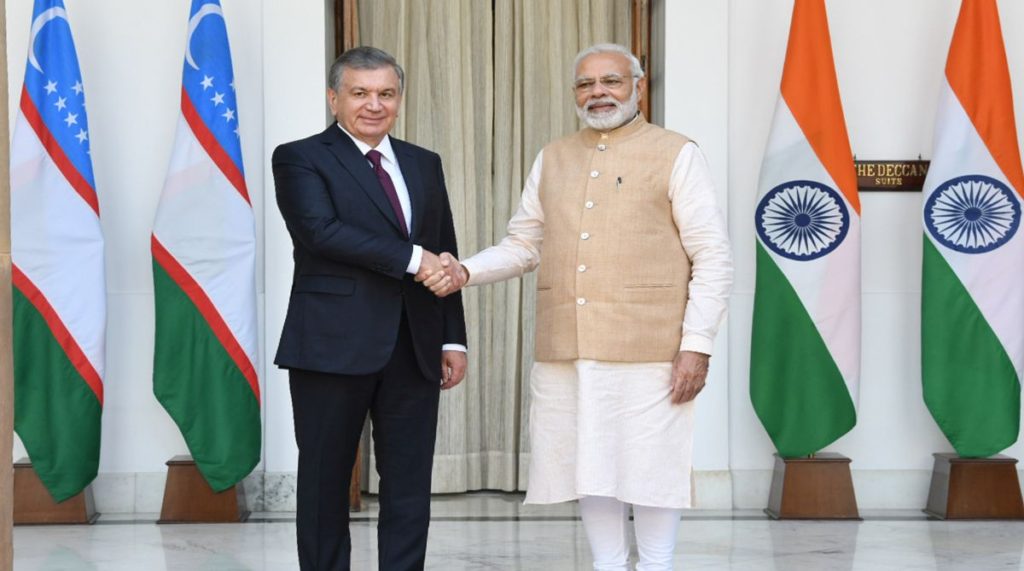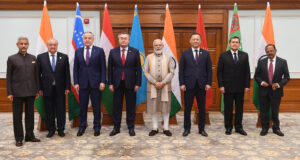On the Potential of “Central Asia-India” Cooperation
The milestone upcoming virtual summit of the leaders of India and Central Asia will not only summarize the interim results of the development of relations, but also present initiatives to further strengthening the mechanisms of bilateral and regional cooperation.

By D. Kurbanov & Sh. Khoshimova
The forthcoming first Central Asia-India online summit on January 27, 2022 is intended to be a milestone in the development of relations between the countries of the region and India as the world’ s 6th largest economy and the active participant in international and regional politics.
The summit is being held on the initiative of India’s Prime Minister Narendra Modi and is a continuation of the policy “Connect Central Asia” pursued by the Delhi government since 2012. It is based on the promotion of multifaceted cooperation with the countries of our region, as part of the so-called “extended neighborhood” of India, in the areas of politics, trade and investment, finance, energy, transport, information technology, medicine, pharmaceuticals, education, science and technology, tourism and others.
An important milestone in the implementation of this course was Prime Minister Narendra Modi’s diplomatic tour to Central Asia in 2015, which included visits to all five states of the region. The arrangements and agreements reached as a result of these visits have helped intensify official contacts and business and humanitarian cooperation in various spheres.
In turn, the Central Asian states, which successfully develop cooperation with leading global and regional partners, see considerable potential in developing multifaceted interaction with India on a bilateral basis and in a regional format.
In our country, the promotion of cooperation with India has been given growing importance, in connection with the large-scale transformation, economic opening, intensification of regional policy in Central Asia and foreign economic activity under the leadership of President Mirziyoyev since 2016.
This is evidenced by President Mirziyoyev’s state visit to India in October 2018, in the course of which 20 bilateral documents were signed, as well as his working visit and participation in the “Vibrant Gujarat” summit in January 2019, and a virtual summit with Prime Minister Narendra Modi in December 2020.
Over the past five years, intergovernmental and interdepartmental contacts have become considerably more active, and direct ties between the regions and business circles of Uzbekistan and India have been established and being developing. Bilateral trade turnover has doubled. The attraction of Indian investments in medicine, pharmaceuticals, education and construction has been on the rise.
The countries of the region are hampered in more actively realizing the considerable potential of our cooperation by the problems of transport connectivity with India and South Asia and the undeveloped mechanisms for stimulating trade, investment and business contacts.
In this regard, Uzbekistan has been an active supporter of the promotion of regional interaction with India. Regional cooperation with New Delhi began in January 2019, when the first meeting of the India-Central Asia Dialogue at the level of foreign ministers was held in Samarkand on the initiative of President Mirziyoyev and Prime Minister Narendra Modi. Since then, India has become part of the 5+1 Dialogue system with leading extra-regional partners, including Russia, the PRC, the United States, the EU, the Republic of Korea and Japan.
Another important vector of cooperation has been the interaction between the parties to promote interregional connectivity. In July 2021 in Tashkent, Indian External Affairs Minister Subrahmanyam Jaishankar attended the International Conference “Central and South Asia: Regional connectivity. Challenges and Opportunities”, at which the President of Uzbekistan presented a comprehensive program of measures to develop cooperation between two regions. In December 2021 in Delhi the Joint Statement of the 3rd meeting of India-Central Asia Dialogue positively noted the results of the Tashkent conference.
It can be assumed that the upcoming virtual summit of the leaders of India and Central Asia will not only summarize the interim results of the development of relations, but also present initiatives to further strengthening the mechanisms of bilateral and regional cooperation.
In this regard, there is a growing interest in promising areas of mutually beneficial cooperation between Central Asian countries and India:
First, increasing mutual trade, attracting Indian investments and credit and financial assistance in the development projects of the countries of region. India is projected to become the world’s third largest economy by 2030, with its GDP rising from $2.7 trillion in 2021 to $8.4 trillion. The country’s consumption market will increase from $1.5 trillion in 2020 to $3 trillion in 2030. In the list of the world’s importers, India will rise from 8th place in 2019 to 4th place in 2030 and 3rd place in 2050. In 2030, India will overtake the EU and become the world’s third largest energy consumer.
Today, India’s trade with Central Asian countries is a little over $2 billion, although its rich energy resources, including oil, gas and uranium, could guarantee a manyfold increase. The mutual efforts to attract Indian investments in energy, pharmaceuticals, medicine, IT and construction, particularly in the Uzbek-Indian free economic zones created in Uzbekistan, will also contribute to this.
The Indian side has extended a credit line of $1 billion to regional countries for joint development projects in transport, energy, IT, medicine, education and agriculture. Grants are also provided for the implementation of social projects. The Eximbank of India provided the Government of Uzbekistan with a credit line of $448 million for financing infrastructure projects.
India and the countries of South Asia can become one of the largest markets for Central Asia, so the establishment of long-term trade and investment ties with them becomes a strategically important task of foreign economic policy for Uzbekistan and the Central Asian countries.
Efforts to promote interaction between the business communities of India and the countries of the region contribute to the achievement of these goals. In February 2020, the India-Central Asia Business Council was established in New Delhi in the framework of the foreign ministers dialogue. It has four working groups: on oil and gas; agro-processing and agricultural machinery; transport and logistics; and pharmaceuticals and biotechnology.
The council aims to become a platform for strengthening trade and investment ties. It will also focus on renewable energy, education, the automobile industry, information technology, civil aviation, urban infrastructure and railroads.
Second, strengthening transport connectivity with India and South Asian countries. The lack of direct transport corridors is the biggest problem today in boosting Indian trade and investment in Central Asia.
 In this regard, the development of transport connectivity between India and Central Asia is at the core of the parties’ relations. In December 2021, a joint statement on the outcome of the 3rd meeting of the India-Central Asia Dialogue declared the need:
In this regard, the development of transport connectivity between India and Central Asia is at the core of the parties’ relations. In December 2021, a joint statement on the outcome of the 3rd meeting of the India-Central Asia Dialogue declared the need:
– optimal use of the North-South International Transport Corridor and the Ashgabat Agreement (to create a multimodal transport corridor from the region to Oman, which New Delhi joined in 2018), to strengthen connectivity between India and Central Asian countries;
– inclusion of the Iranian port of Chabahar in the framework of the North-South ITC;
– development of transit and transport potential of the countries, improvement of regional logistics networks and promotion of joint initiatives on new transport corridors.
The joint statement highlights the outcomes of the Tashkent conference on the Central and South Asian regions connectivity and the ministerial meeting of Uzbekistan, India and Iran on joint use of Chabahar.
The Indian side also favors intensifying cooperation in civil aviation and the digital economy, believing that these areas can be an important complement to the multimodal transport corridors being created. Given the enormous potential of cargo and passenger transit associated with India, this opens up good prospects for the development of the Navoi logistics hub and the regional countries’ airports and the promotion of e-commerce in Central Asia.
New Delhi is actively developing cooperation on regional connectivity with the European Union, the EAEU, Japan and ASEAN. Within the SCO, of which India became a member in 2017, India has prioritized the development of the North-South ITC, the creation of a trans-Afghan rail corridor to Central Asia and Russia from Chabahar port through Iran, as well as the EU-Russia-North-South ITC-India-ASEAN route.
Obviously, the implementation of these plans will benefit the building of trans-Afghan corridors, including the construction of the railroad “Mazar-e-Sharif-Kabul-Peshawar” and the development of transport and logistics interaction between Uzbekistan-India-Iran, as it will increase the transit of goods through Central Asia, attracting investment to strengthen connectivity with South Asia and other regions of Eurasia.
Third, the intensification of India’s promotion of digital transformation and the growth of Central Asian digital economies. India is rapidly becoming one of the global centers of the digital industry. Thanks to the implementation of the Digital India program, in 5 years the output of the digital sector will reach $1 trillion. The country is actively developing digital technologies such as artificial intelligence, the Internet of Things, machine learning and data analysis. These technologies have already been widely implemented in finance, education and medicine.
The development of cooperation with India in this area can give an impetus to the implementation of the Digital Uzbekistan 2030 Strategy and similar programs of the regional countries. This is already facilitated by leading Indian universities in the country, such as Amity and Sharda, training Uzbek specialists in digital technologies.
Expanding the network of joint clinics with India will stimulate the active implementation of digital technologies in medical practice. India is the world’s number one exporter of ICT services, and developing its digital connectivity with Central Asia will accelerate the development of business process outsourcing and the overall development of digital economies in the region.
Fourth, cultural and humanitarian interaction with India will allow accelerating the modernization of the cultural sphere and the development of cultural diplomacy of our countries. The peoples of Central Asia and India have for centuries been closely linked by political, economic and humanitarian ties. This has promoted mutual enrichment of cultures, intellectual and spiritual progress, dissemination of thoughts, ideas, religions and philosophies. Such classics of culture and science of our countries as Beruni, Ibn Sino and Alisher Navoi had active links with Indian thinkers and cultural figures. Studying these contacts will enrich the history of mutual relations, and will activate the cultural exchange and cultural diplomacy of our countries.
Indian experience in the development of education, medicine, culture, tourism and international cultural exchange could be useful for modernization and development of humanitarian sphere in our countries. Joint promotion of common cultural heritage can stimulate the development of tourism and interaction in general.
Thus, the significant potential of Uzbekistan and Central Asian countries’ cooperation with India is obvious. Active promotion of cooperation with Indian partners on a bilateral and regional basis can help address important challenges in implementing the New Uzbekistan Development Strategy and modernizing our country and the entire region. The upcoming virtual summit of the leaders of Central Asia and India and the implementation of its main agreements and initiatives can become an important point of reference in the common efforts to promote cooperation and prosperity of the peoples of our countries.
D.Kurbanov is Director of the Center for International Relations Studies, Uzbekistan;
Sh. Khoshimova is Chief Researcher, Center for International Relations Studies, Tashkent.